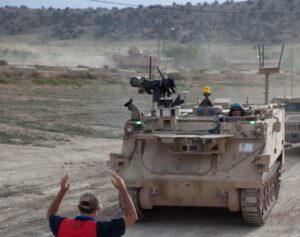The Army announced Thursday it is starting a new small-business cohort looking for innovative ideas to apply sensor capabilities for sustainment of its future fleet of Robotic Combat Vehicles (RCV.)
The first phase of the program will include selecting up to 10 firms, who will each receive $200,000, to work on their ideas over a 12-week period. Then, the Army will downselect five businesses to move forward and receive up to $1.5 million each to continue refining concepts over another two years.

“Robotic Combat Vehicles reduce the risk to Soldiers and deliver advantages during conflict. But the U.S. Army can only retain these advantages if RCVs can stay in the fight. As part of modernization efforts, the Army wants to implement smart sensor capabilities to help sustain these platforms. From remote troubleshooting, to predictive maintenance, to the ability to anticipate resupply, these capabilities will be critical to the future ground force,” the Army Applications Lab (AAL) wrote in an announcement detailing the new cohort.
The RCV Sustainment cohort, a partnership between AAL and the Next-Generation Combat Vehicle Cross-Functional Team, is the service’s latest Special Program Awards for Required Technology Needs (SPARTN) Small Business Innovation Research (SBIR) program to bring in non-traditional partners to work on novel challenges.
The Army recently selected five small businesses to refine concepts for delivering a faster rate of fire for the future Extended Range Cannon Artillery system under the SPARTN SBIR Fire Faster Cohort (Defense Daily, April 16).
For the RCV Sustainment cohort, the Army said it’s interested in ideas for fusing fuel level and altitude sensor data to amend refueling requirements, the ability to remotely corroborate reported vehicle damage and identify fixes, tools to predict battery degradation, methods for prioritizing critical data for transfers made in degraded communication environments and an integrated user interface to display sustainment-related information.
“Ultimately, the Army must be able to gather, fuse, and interpret RCV sustainment requirements and operational capabilities in order to deliver actionable information to decision makers and end users,” the AAL wrote.
The Army is currently working with prototypes for the RCV-Light, built by Qinetiq and Pratt Miller, and RCV-Medium, developed by a Textron Systems [TXT] team, with both platforms set to undergo testing in the coming months ahead of a major operational experiment in 2022.
Applications to participate in the RCV Sustainment cohort will be accepted from June 3 to 23, and the Army will hold two information webinars on May 19 and 25 to detail the program.